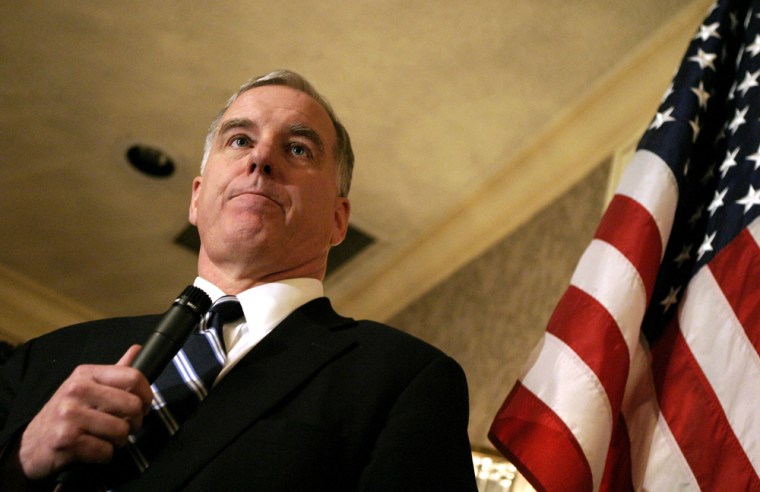There is a sort of swagger to Howard Dean’s smile.
Here he is, taking charge of the Democratic Party, a striking comeback after his flameout a year ago in the presidential race. He is savoring the moment, yet displaying a new sense of caution.
“There are a lot of people in this city who are afraid I’m going to be very unorthodox — and I am,” Dean tells a door-busting crowd of supporters in the lead-up to his election Saturday as party chairman. But the bruises from his crash to Earth after flying high at the start of the presidential primary season are still so fresh that Dean is displaying a new, determined effort at restraint.
“I’m going to be a little careful about the directional mike this time,” he says at the start of a recent speech, a reference to the microphones that amplified his oft-mocked scream in Iowa. His “wow” at the size of the crowd this time sounds more like a flat statement of fact.
‘Too early to tell’ what impact will be
Dean knows he is on probation.
“Double secret probation,” says Dick Harpootlian, former state chairman of the South Carolina party.
“The question is how he will project the image of the Democratic National Committee,” Harpootlian said. “The opinions on this range from disaster to huge success, and it’s too early to tell.”
Supporters of Dean, the former governor of Vermont, know his chairmanship may well be a wild ride, but they’re betting on his proven organizational and fund-raising skills — he raised a record $41 million in a single year — and on his ability to inject energy and enthusiasm into the Democratic ranks. They point to his successful tenure as chairman of the Democratic Governors Association, to his tireless work last year for state and local candidates whom national party leaders were neglecting, to his ability to attract legions of new young Democratic foot soldiers to his presidential campaign.
“The weakness that everyone in Washington is afraid of is almost his strength,” said Elaine Kamarck, a member of the Democratic National Committee who was an early backer of Dean’s bid to lead the party. “He actually has the ability to lead people and inspire people. This is not a bad trait in a party chairman.”
Some advice for Dean
Still, even Dean’s fans stress that he will have to exercise discipline to keep his focus on party mechanics and organization, not necessarily an easy thing for a longtime governor with a passion for policymaking.
Gerald McEntee, president of the American Federation of State, County and Municipal Employees, offers this advice: “OK, Howard, just remember that you’re not running for president and you’re not running for governor and you’re not running to be the head of the Senate or the head of the House. That’s the way you have to do it.”
Early in the week, as it became clear that Dean was likely to be the next party chairman, House Minority Leader Nancy Pelosi, D-Calif., in a news conference with her Senate counterpart, said she expected Dean to “take his lead from us” on some issues. But she seemed to acknowledge some concern about his selection in adding: “He hasn’t been elected yet. Why don’t we spend time on the crises we have?”
Jim Dean, the candidate’s brother, says he can tell from Howard’s tone of voice that “he’s very much approaching this the way he approached his office when he first became governor. He knows there’s plenty to learn and plenty to get acclimated to. He’s got some plans and some convictions about what he wants to do, but I think he’s taking a very open approach.”
Dean expects to stay aggressive
No one expects Dean, famously outspoken, to completely muzzle himself. Dean jokes that the Washington insider’s definition of a gaffe is “when you tell the truth and they think you shouldn’t have.”
His style ever will be blunt: “We have to never be afraid to say what we believe,” he insists.
But Bruce Reed, president of the centrist Democratic Leadership Council, which has had its share of differences with Dean, cautioned: “Like any party chair, he’ll do fine as long as he remembers the Hippocratic oath: First do no harm.”
While many party chairmen come into office with a lower profile — few Americans know much even now about the outgoing chairman, Terry McAuliffe, or Republican Chairman Ken Mehlman — Dean has work to do in reshaping his reputation as a Northeastern liberal, which some in the party believe sends the wrong message. Dean, a doctor who continued to practice medicine even as lieutenant governor, generally was regarded as a moderate in Vermont but became the hero of liberals in the presidential campaign with his early denunciation of President Bush for going to war in Iraq.
Harpootlian said the image of the party and of Dean had shifted so far left that “they look at us as the Haight-Ashbury of parties. There’s a perception that he’s Ken Kesey. He’s got to turn that around.”
